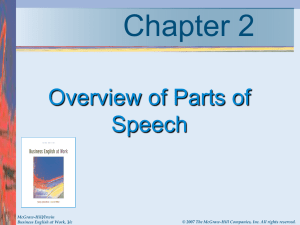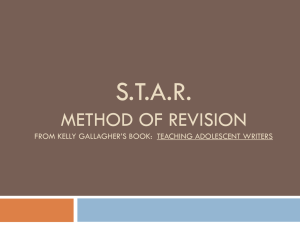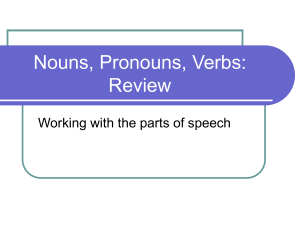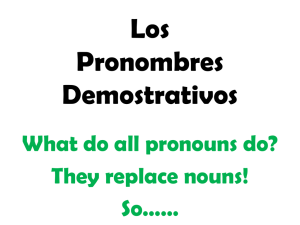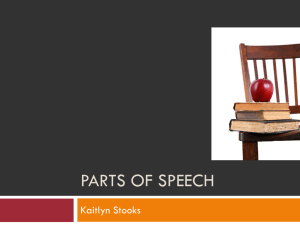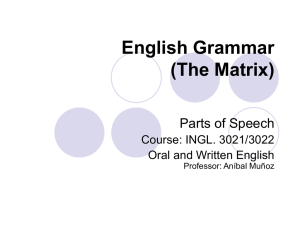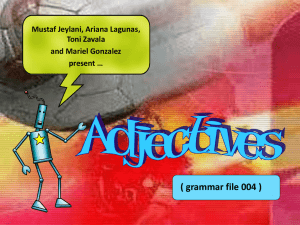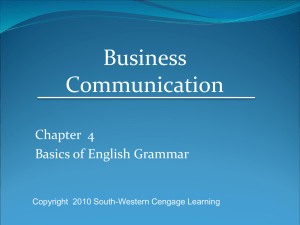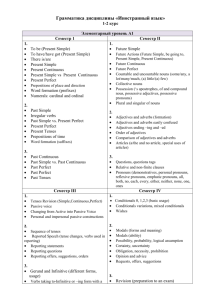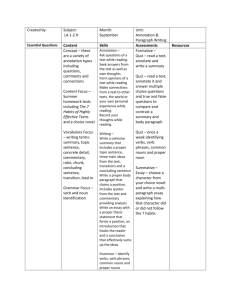Parts of Speech - Mounds View School Websites
advertisement
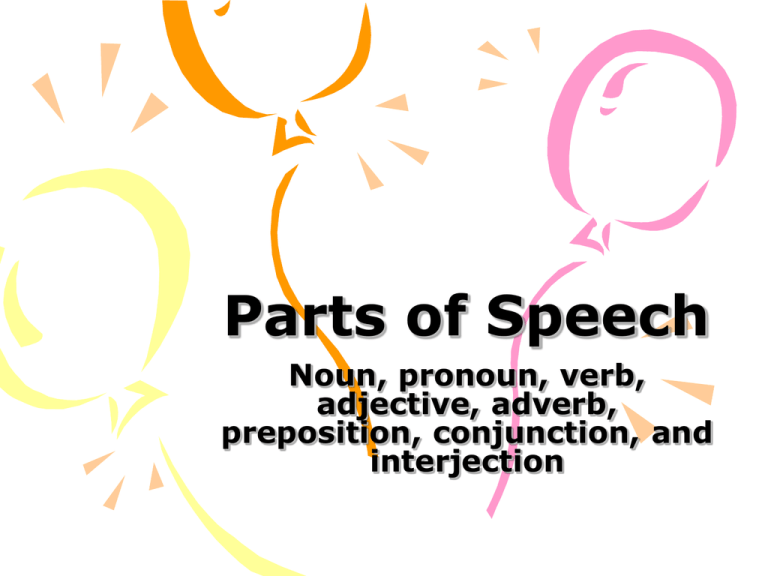
Parts of Speech Noun, pronoun, verb, adjective, adverb, preposition, conjunction, and interjection Why study parts of speech? • Common terminology • Helps you with word choice • Helps you with parallel structure (sentence consistency) • Helps you better understand phrases and clauses • Enlarges your vocabulary Nouns • NOUNS: A noun is a word used to name a person, place, thing, or idea. • Common nouns name a class of something, like planets, states, athletes. • Proper nouns name something particular and are capitalized: Venus, Minnesota, Joe Nathan. • Concrete nouns name an object that can be seen, heard, tasted, touched, or smelled: bread, opera, stubble, chocolate. • Abstract nouns name a concept or an emotion: happiness, independence, honesty, freedom. Common nouns are orange, proper nouns in pink • 1. A sari is a garment worn by women in India. • 2. One book described the crash of the Titanic into an iceberg in the Atlantic. • 3. John and Cara are taking the bus to go to a baseball game in the Metrodome. • 4. The surprise was four tickets to Jamaica in January. • 5. Her attitude was pleasant, but her remarks were not. Common nouns are orange, proper nouns in pink • 6. Mama Mia! is a musical based on songs by Abba and was made into a film. • 7. Sponge Bob Squarepants is a cartoon on Nickelodeon. • 8. Michael Phelps is a swimmer who won eight gold medals in the Olympics. • 9. Harry Potter is the name of the hero in a series by J.K. Rowling. • 10. St. Paul is the host of the Republican Convention. Concrete nouns in green, abstract nouns in pink • 1. Our dog loves the freedom of our large yard. • 2. Harriet Tubman risked her safety to help runaway slaves. • 3. Vincent van Gogh is the artist who painted The Starry Night. • 4. James appreciated the patience and kindness shown by his teacher. • 5. Ramona needed a tissue after experiencing the sadness of The Notebook. Concrete nouns in green, abstract nouns in pink • 6. Experts regard Edgar Allan Poe as a master of mystery and imagination. • 7. The athlete wept with joy and gratitude when she won the competition. • 8. Mrs. Baron refused to allow the noise to ruin her speech. • 9. Many causes contributed to the Vietnam War. • 10. Sam's father has gained an appreciation of hip hop. Pronouns • A pronoun is a word used in place of a noun. The word a pronoun stands for is called its antecedent. • There are six types of pronouns: personal, relative, interrogative, demonstrative, and indefinite Personal pronouns (23) • I, me, my, mine • We, us, our, ours • You, your, yours • He, him, his • She, her, hers • They, them, their, theirs • It, its Relative pronouns (5) • Who • Whom • Whose • Which • That Interrogative pronouns • Used to ask a question • What, Which, Who, Whose, Whom • Notice that some are the same as relative pronouns Demonstrative pronouns (4) • This • That • These • Those Indefinite pronouns (31) • Singular: another, anybody, anyone, anything, each, either, everybody, everyone, everything, little, much, neither, nobody, no one, nothing, one, other, somebody, someone, something • Plural: both, few, many, others, several • Singular or Plural: all, any, more, most, none, some Reflexive pronouns (8) • Myself • Ourselves • Yourself, yourselves • Himself • Herself • Themselves • Itself Exercise 4 • 1. I asked Frank to bring in the mail when he came inside. • 2. He kept two letters for himself and handed me a large envelope. • 3. It was a friend of mine in Colorado. • 4. The envelope had seven stamps on the outside, and each was different from the others. • 5. Among the stamps was one with a picture of Harriet Quimby on its face. Exercise 4 • 6. She was a female pilot who was also a pioneer in the history of aviation. • 7. Quimby is not as famous as Amelia Earhart, who disappeared over the Pacific Ocean. • 8. Who is the man pictured on the stamp next to hers? • 9. That is Luis Munoz Marin, who served four terms as governor of Puerto Rico. • 10. He greatly influenced its history, which is quite an accomplishment. Pronouns in blue, antecedents in orange • In Charleston, South Carolina, the basket makers visit among themselves as they sit, weaving their baskets. The basket makers practice an art that is three hundred years old. It has been passed from one generation of women to another. The baskets themselves were once made to store rice harvested by slaves. Later, they were used to carry vegetables and fruit. People who stop to watch a basket being made understand the skill and labor basket weaving takes. Even the smallest basket requires hours of work, making it expensive. Tourists seem willing to pay the price without complaining about it. They appreciate the fine workmanship. The three hundred families who make baskets today are proud of their tradition. VERBS: A verb is a word that shows either action or state of being. • Action verbs: play, run, gargle, sleep • To be verbs: am, are, is, was, were, be, being, been • Linking verbs: appear, become, fall, feel, get, grow, lie, prove, remain, run, seem, smell, sound, stay, taste • Remember, linking verbs simply connect two words. There is no transfer of action from a subject to an object. Exercise 6 • • • • • • • • • • 1. Rudy raked the leaves in the back yard. 2. A cold wind whipped through the trees. 3. Mary expects a college acceptance letter in the mail. 4. The Mustangs hope to win their first home game. 5. Because of the drought, the farmer worried about his crops. 6. Andy poured a glass of lemonade. 7. Corinne recited a poem aloud for the class. 8. The freshmen came to school a day before everyone else. 9. Michael Phelps won eight gold medals and set a new record. 10. Students auditioned for the fall play. Linking verbs in green, linked words in blue • 1. The gymnast was pleased with her performance. • 2. Meg feels peaceful after a long run. • 3. The tacos smell delicious. • 4. Wanda's older brother is my Spanish tutor. • 5. That was a childish thing to do. • 6. We were too noisy. • 7. That story sounds fishy to me. • 8. In fairy tales, some animals become humans at night. • 9. My neighbor grew taller this summer. • 10. I became the winner after my Yahtzee. Action verbs in pink, stateof-being verbs in orange • 1. The children grew taller, and the farmer grew corn. • 2. The girl felt the heat of the warm fire, and soon she felt drowsy. • 3. Mark's face turned red from exertion as he turned over the huge boulder. • 4. Amanda looked tired as she looked at all the homework she had to do. • 5. Enrico smelled the pizza in the oven, and it smelled good. • 6. The conductor appeared to be pleased when he appeared on the stage. • 7. Felicia got mad after she got hours of homework in her math class. • 8. Jonas acted surprised when he discovered his father had acted in many plays. A verb phrase consists of the main verb and its helping verbs. • Once upon a time there was a wealthy merchant named Mr. Do. Mr. Do was very old and very rich. His many relatives were dreaming of the day the old man would die. They wondered which one of them would inherit his money. Finally, one day Mr. Do did die. All the relatives searched his house for a will. They didn't find one. They searched his house three times. They still did not find a will. The relatives did not get one dime of Mr. Do's fortune. • The moral: Maybe Mr. Do should have a will. • Just remember this sentence and you will know how to set up a chart of the 23 helping verbs! The largest "family" is the be family with eight members. The other five families have three members each. The five helping verb families: May Might must Be Being Been Am Are Is Was Were Do Should Does Could Did Would Have Will Has Can Had Shall “Helping Verb Song” Tune: “I Love You” (The Barney Song) Have, has, had, Do, does, did, Be, am, is, are, was, were, been, Can, could, shall, should, will, would, may, Might, must, being are helping verbs. Helping verbs in blue, main verb in green • 1. You may have heard of the National Honor Society tutors in the library. • 2. They can help students with all kinds of assignments. • 3. Students should listen to the announcements for the tutoring times. • 4. Many have been helped by NHS members. • 5. Tutors can quiz students for tests. • 6. Tutors will not make students feel dumb. • 7. Everyone should take advantage of these tutors. • 8. Some tutors can work with students having difficulty with the English language. Adjectives • An adjective is a word used to modify a noun or a pronoun and answer one of three questions-• What kind? Red ones, tall ones, disgusting ones • Which one? This one, that one, every one • How many? Ten dollars, fifty cookies • A, an, the are adjectives but are usually called articles and will not be used as adjectives in the exercises. Adjectives in pink, nouns described in green • 1. The small plane made several attempts to land safely. • 2. What lucky fishing group caught those trout? • 3. Ancient glaciers have created a large wilderness in northern Canada. • 4. The fox dashed across the grassy meadow, looking for some food. • 5. The prizewinning photographer said his best shots were unusual. • 6. Seven generations of my family have lived in this isolated village. • 7. The tired tourists walked around the foggy city but did not mind the bad weather. • 8. The audience was surprised when ten members of the cast seemed to fly. • 9. That castle is famous for its mahogany walls and stained-glass windows. • 10. The new students were lost, but friendly people helped them find their way. Nouns are orange, pronouns are pink, verbs are blue, and adjectives are green. • A New York City vacation is one your family will always remember. • New York City has so much to see and do that you will be busy from the moment you arrive. • When my family and I visited the Big Apple last summer, we stayed at the Mayflower Hotel. • Our rooms were on the seventh floor, overlooking Central Park. • What an ideal place that is to watch people! Nouns are orange, pronouns are pink, verbs are blue, and adjectives are green. • On Monday morning we awakened early and took a subway train to Battery Park. • There we purchased tickets for a ferry ride to the Statue of Liberty and Ellis Island. • These two attractions reminded me that America is a land of immigrants. • Photographs of some of the twelve million people that passed through Ellis Island are displayed in its main building, which was recently renovated. • What a memorable experience! ADVERBS: An adverb is a word used to modify a verb, an adjective or another adverb. • Adverbs answer four questions: • Where? Here, there, everywhere, nowhere • When? Today, yesterday, soon, never • How? Well, sloppily, easily, poorly, quickly • To what extent? Rather, very, not Adverbs in purple, verbs described in orange • 1. The police searched everywhere for the stolen bracelet. • 2. The first graders willingly participated in the geography contest. • 3. The map of the world was brilliantly painted. • 4. Claudia spoke endlessly about her trip to Europe. • 5. You left your jacket here. • 6. Today the mail arrived early, something that is unusual. • 7. You can completely depend on Joe because he always works hard. • 8. Seth exercises frequently and eats well. • 9. Diego nearly lost his iPod. • 10. Fortunately, school starts late on Wednesday. Adverbs in purple, adjectives described in orange • • • • • • • • • • 1. After her run, Patsy was thoroughly exhausted. 2. Mark was especially kind to his young cousin. 3. This chili tastes especially spicy. 4. The crowd's reaction to the bad call was not unusual. 5. That is an extremely heavy box; lift with your legs. 6. The usually loud Mustang Stable was suddenly quiet. 7. The overly choosy batter watched the pitches fly by. 8. The soloist was slightly flat during the concert. 9. The two year old was completely wild. 10. I was very angry with the way my mother talked to my friends. Adverbs explaining to what degree in purple, adverbs described in orange • • • • • • • • • • 1. Kari spoke rather slowly. 2. Juan explained very precisely what had happened. 3. Don leaned alarmingly far over the ledge. 4. The students in the cafeteria complained extremely loudly about the lack of space. 5. I awoke somewhat early, which is unusual for me. 6. Increasingly often I am finding trash along the street. 7. Maren told her story perfectly calmly. 8. John played even better than Justin. 9. I thank you most sincerely for the gift. 10. Sid was checking the mail almost daily for the package. Adjectives in green, adverbs in pink • 1. “How are we supposed to know?” he asked SARCASTICALLY. • 2. Nobody knows whether he will come HERE or not. • 3. The donor remains ANONYMOUS. • 4. I NEARLY fell off my chair when you sneaked up behind me. • 5. The day was LOVELY. • 6. SUDDENLY I no longer cared who had the bigger piece of cake. • 7. I was TOO angry to speak to anyone. • 8. That was the LONGEST speech she’s ever given. • 9. Late autumn seems GRIM to those who love summer. • 10.Can you skate BACKWARD without a BACKWARD glance? Adjectives in green, adverbs in pink • 1. SnoDaze is quite an interesting week at Mounds View High School • 2. First, students are encouraged to dress in crazy costumes to show their school spirit. • 3. Participants compete daily in a variety of fun events. • 4. Teams decorate their hall extravagantly and often enthusiastically. • 5. The pepfest schedule usually confuses students, especially freshmen. • 6. Most students going to the pepfest cheer loudly when royalty is crowned. • 7. Students going to the dance sometimes spend a large amount of money. Prepositions • A preposition shows the relationship of a noun or a pronoun to some other word in the sentence. Usually, prepositions are used to show where something is located or when something happened. They function like adverbs, but they introduce a prepositional phrase. • • • • • • • Above At Below On By Over From Before Into Among Between Since To Beside For Off In With After Across Through “Preposition Song” • Tune: “Twinkle, Twinkle, Little Star” In, on, under, by, beside, Over, next to, off, behind, After, from, before, until, During, to, for. From, between, At, above, below, among, With, since, out, into, up, down. Prepositions in orange, objects in purple • • • • • • • • • • 1. (After the game) we decided to go out (for pizza). 2. The first day (of the semester) is usually a long one. 3. Mark's mother asked him to go (to the store). 4. Dogs need to go (on daily walks). 5. Many people make frequent trips (to Target). 6. The ball flew (over everyone's head). 7. (Next to pizza) tacos are Jen's favorite food. 8. Ms. Hallberg comes (from Little Falls). 9. Mrs. Rosin has two children (in college). 10. Mr. Morrissette taught (at Stillwater High School) before he came (to Mounds View). Prepositions in blue, adverbs in purple • • • • • • • • • • 1. "Turn the light off," said the teacher. 2. The ball bounced (off the wall). 3. The cold children ran (into the house). 4. The friendly host urged his guests to come in. 5. "See you around," said Sarah casually. 6. The students ran (around the track) during gym. 7. “(Over the river) and (through the woods), (to grandmother's house) we go." 8. John asked us to come over, but we had other plans. 9. Susie grew tired and fell behind (during the race). 10. Look (behind the door) to see who is here. Conjunctions and interjections • A conjunction joins words or groups of words, and an interjection expresses emotion. • Examples of coordinating conjunctions (7): for, and, nor, but, or, yet, so (FANBOYS) • Examples of correlative conjunctions (5 pairs):neither-nor, either-or, bothand, not only-but also, whether-or • Examples of interjections: Hey! Wow! Awesome! Aw! (KEEP THEM CLEAN) Conjunctions in green, interjections in yellow • 1. Hey! What do you think you're doing? • 2. Either you or I need to baby sit tomorrow night. • 3. I'm not sure whether Sally or Kristina will be at the party. • 4. Well, what do you think? • 5. Not only your brother but also your sister will be at the graduation party. • 6. Both Callie and Sam plan to bring pizza tomorrow night. • 7. Yikes! Who let that wasp in the room? • 8. No, I don't plan to attend the meeting. • 9. I had forgotten to do the assignment, so I didn't do so well on the test. • 10. I told John we should stay home, but he still wanted to go to the movies. Nouns in blue, pronouns in yellow, adjectives in pink, adverbs in green, verbs in brown, prepositions in orange, conjunctions in gray, interjections in maroon • College Writing Lab is an extremely important class for students to take. Not only do they learn how to write better sentences, paragraphs, and papers, but they also learn how to edit more carefully. Besides reviewing the parts of speech, students will become more intentional with all the different types of punctuation. They will also work on word choice and parallel structure while discovering ways to avoid dangling and misplaced modifiers. Students who take this course seriously will be well prepared for college. In addition, they receive an excellent review for the ACT and SAT. Wow! Who could ask for anything better than that? • Which words are NOT adverbs? suddenly lonely stealthily over red friendly outside French quite • Which words are NOT adjectives? friendly horrible green under focused glum twenty Hawaiian quickly • Which words are NOT prepositions? over under between because of however on not among • Which words are NOT verbs? freedom fight am inch under remain skip bolt eyeball soon tomorrow not well surprisingly not soon inside down work focus sink • • • • • • • • • • • • 1. The band played LOUDLY. Adv 2. TOMORROW we have a grammar test. Adv 3. Josh carried the ball TWENTY yards. Adj 4. Maria skied DOWN the slope. Prep 5. I want to know WHETHER you’re coming. Conj 6. Erik enjoys KNITTING. N 7. Billy Ray Bob came FROM the barn. Prep 8. DOWN came the rain and washed the spider out. Adv 9. Roses are RED; violets are blue. Adj 10. It's the real THING. Pro 11. Can you hear me NOW? Good. Adv 12. Hungry? Why WAIT? V • • • • • • • • • • • • • • 13. Have it YOUR way Adj 14. Be a PEPPER! N 15. It's the ULTIMATE bubble. Adj 16. Snap! Crackle! POP! Int. 17. They're G-R-REAT! Adj 18. Betcha can't eat JUST one. Adj 19. The milk chocolate MELTS in your mouth - not in your hand V 20. You deserve a BREAK today N 21. When it rains, it POURS. V 22. Obey YOUR Thirst Adj 23. Head FOR the Border Prep 24. Oh, WHAT a feeling Pro 25. Be all that you CAN BE. V 26. Breakfast OF Champions Prep
